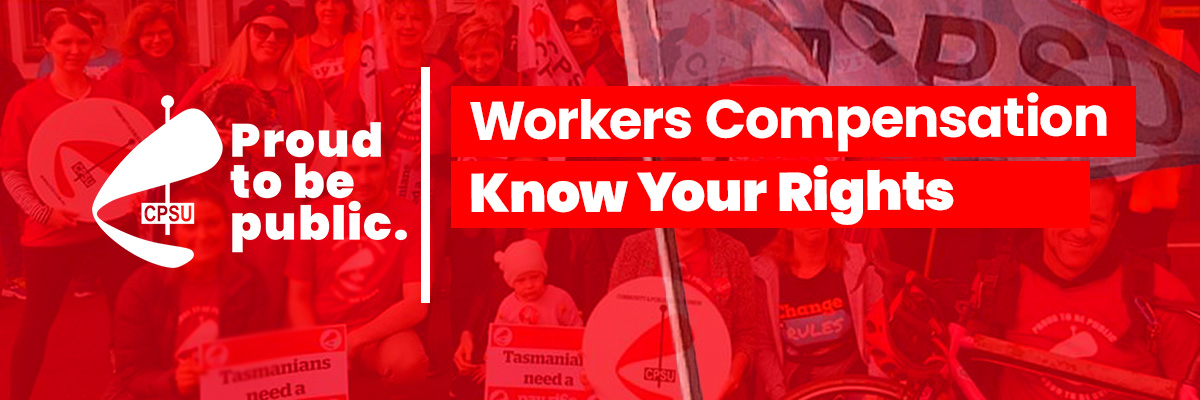
Unions are working hard to bust some of the all-too common myths about workers compensation – and some of the flat out lies workers are told to discourage them from making a claim. A core pillar of our 100 Claims for a Better State Service is Trauma-Safe Workplaces – aimed at addressing the poor supports in place for workers who regularly deal with occupational violence or aggression, or who are exposed to greater risk of psychological injury in their work.
We’ve seen a cultural conversation aimed at smashing the stigma around mental illness psychological injury, such as post-traumatic stress. As a result, the number of workers compensation claims related to psychological injury have gone up – but nowhere near the levels these injuries are reported to unions.
The fact is, too many workers (perhaps justifiably) believe they are unlikely to be believed or will face shaming and gaslighting from their employer if they try to exercise their rights. In our recent survey of CPSU members, just 9% of respondents who had experienced traumatic stress as a result of their work submitted a workers compensation claim. This is despite a chilling 60% of respondents sharing that they had experienced occupational violence, aggression or a traumatic event in the workplace. A greater percentage, 12%, opted instead to take extended leave, such as personal or stress leave.
The first step to fighting back against stigma in the workplace is knowing where you stand, followed by getting union active with your colleagues to make sure everybody’s rights are known and protected.
BUSTING THE MYTHS AROUND WORKERS COMPENSATION
CPSU members regularly tell us they feel confused about the process and struggle to gain clarity from the Employer. Some even experience coldness and feeling shut out once they’ve made a claim.
Pressure, misinformation and toxic employer policies to dispute each and every claim (effectively enforcing the presumption that workers are making a false report) have helped to drive workers away from making legitimate claims following injuries that resulted from their work. Often this has a cumulative toll – or even leads to worse injuries such as retraumatisation.
The more of us that stand together in union, the harder it is for employers to get away with dodgy, manipulative and coercive practices. Next, let’s smash the top four myths about workers compensation:
MYTH #1: “Your employer gets to pick your doctor.”
FACT: You can choose your own doctor. Your Employer doesn’t get to substitute their preference. Your doctor is your right.
MYTH #2: “Your employer can accompany you to a medical appointment.”
FACT: No one can attend your medical appointment with you unless your doctor agrees. Period.
MYTH #3: “You must consent to an interview with an investigator.”
FACT: You don’t have to participate in an interview with an investigator – they work for the Department’s Insurer and are generally working to dispute your claim.
Trying to manipulate you into believing otherwise is bullying. Know your rights – and know your union has your back.
MYTH #4: “You don’t get compensated unless you win – and that could take months. It isn’t worth it.”
FACT: Once your claim is submitted, your Employer MUST begin paying you weekly payments. Regardless of the paperwork you receive, you have a right to continue to get paid until the Tribunal makes an order to the contrary.
Too often workers are led to believe (or wrongly told) that they have to be strung through the full administrative process to even get access to workers compensation. That’s wrong.
Let’s go over the basics one more time:
- Once your claim is submitted, your Employer must pay weekly payments.
- You continue to get paid until the Tribunal makes an order.
- You can choose your own doctor.
- You don’t have to participate in an interview with an investigator – they work for the Department’s Insurer and are generally working to dispute your claim.
- No one can attend your medical appointment with you unless your doctor agrees.
- Your Employer does have a right to send you to an independent medical assessment, but the independent medical assessment must be sent to your GP so you can obtain a copy. And you can still use a letter from your GP as evidence if necessary to challenge an independent medical assessment.
There’s plenty of support available from your union. This includes:
- On-the-spot expert advice from CPSU Direct on 6234 1708 or at CPSUDirect@tas.cpsu.com.au
- CPSU members can access a 30-minute appointment with our partner firm Ogilvie Jennings for legal advice about the merits of their claim, at no cost.
- Worker Assist also offer free, independent, and confidential advice for injured workers. You can call them on 1300 027 747 or go their website and fill out the members details to request contact.
Remember – your union is right here, by your side.
Finally, we’re also standing up to reduce the toll of occupational violence, aggression, and trauma in our workplaces through your next public sector unions wages agreement. One of our core pillars, Trauma-Safe Workplaces, includes claims for new supports as well as additional leave for occupations regularly exposed to trauma. You can learn more about our claims at https://www.cpsu.com.au/psuwa/.
Most importantly, if these issues matter to you, speak to a colleague today and encourage them to join the union at https://www.cpsu.com.au/join. Because only by standing together do we have a chance at changing the culture and securing the new rights we desperately need.








